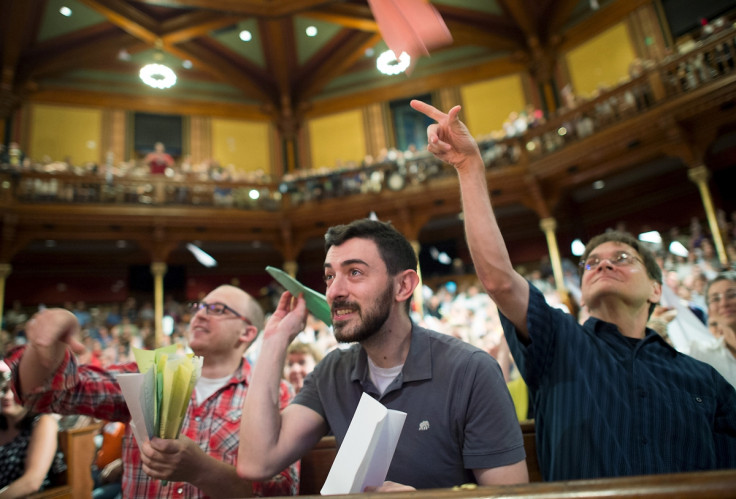Ig Nobel awards: Chickens that walk like dinosaurs, unboiling eggs and intense kissing benefits

The Ig Nobel Prize winners were announced today (18 September), with a chemical recipe to unboil an egg taking home the prize for chemistry. Other winning research included finding out that chickens walk in a similar fashion to dinosaurs when a weighted stick is attached to their rear end, a study into the biomedical benefits or consequences of intense kissing, and a man who let bees sting him on 25 parts of his body to determine which area is the least and most painful.
The Ig Nobel Prize awards are a parody of the Nobel Prize awards, celebrating unusual achievements in the fields of science, medicine, and technology. The awards for "improbable research" are now in their 25<sup>th year, with the award ceremony taking place at Harvard University.
Most painful place to get stung by a bee
The person behind the research into the most painful place to get stung by a bee is Michael L. Smith from Cornell University. His painful experiment determined that the least painful places to get stung are the skull, middle toe tip and upper arm. The the most painful places were the nostril, upper lip, and penis shaft.
Explaining why he chose to embark on the painful project, Smith told IBTimes UK: "It seemed like a pretty basic question; 'Where's the worst place to be stung by a bee?' But we didn't know!"
He described winning the Ig Nobel Prize as an "honour", saying: "The Ig Nobel's are a great celebration of science – first make you laugh, then make you think. You can't take yourself too seriously, even in science – or especially in science." The bee-enthusiast is now looking at reproduction and puberty in honey bee colonies.
'Huh?' wins literature award
Another winning project was the research conducted by Mark Dingemanse and his colleagues from The Netherlands. The Ig Nobel literature prize winner discovered that the word "huh?" exists in every human language, although he's not sure why.
He said: "What may be most surprising about our finding is not that 'Huh?' appears to be universal, but that this was discovered only now. Linguists have only recently started to compare conversation across cultures. There's a lot still to find out."
From quick whiz to bribing cops
Other winners included a team that found out nearly all mammals are able to urinate in 21 seconds, and Bangkok's Metropolitan Police who won the prize for economics after offering to pay policemen extra cash if they refuse to take bribes.
Full list of 2015 Ig Nobel Prize winners
Chemistry: A chemical recipe to partially unboil an egg; Callum Ormonde and Colin Raston (Australia), and Tom Yuan, Stephan Kudlacek, Sameeran Kunche, Joshua N. Smith, William A. Brown, Kaitlin Pugliese, Tivoli Olsen, Mariam Ifikhar, Gregory Weiss (USA)
Physics: Testing the biological principle that nearly all mammals empty their bladders in about 21 seconds; Patricia Yang (USA and Taiwan), David Hu (USA and Taiwan), and Jonathan Pham, Jerome Choo (USA)
Literature: Discovering that the word "huh?" (or its equivalent) seems to exist in every human language – and not being quite sure why; Mark Dingemanse (The Netherlands, USA), Francisco Torreira (The Netherlands, Belgium, USA) and Nick J. Enfield (Australia, The Netherlands)
Management: Discovering that many business leaders developed in childhood a fondness for risk-taking, when they experienced natural disasters that – for them – had no dire personal consequences; Gennaro Bernile (Italy, Singapore, USA), Vineet Bhagwat (USA), and P. Raghavendra Rau (UK, India, France, Luxembourg)
Economics: Offering to pay policemen extra cash if the policemen refuse to take bribes; The Bangkok Metropolitan Police (Thailand)
Medicine: Experiments to study the biomedical benefits or biomedical consequences of intense kissing (and other intimate, interpersonal activities); Hajime Kimata (Japan, China), Jaroslava Durdiakova (Slovakia, USA, UK), Peter Celec (Slovakia, Germany), Natalia Kamodyoya, Tatiana Sedlackova, Gabriela Repiska, Barbara Sviezena and Gabriel Minarik (Slovakia)
Mathematics: Trying to use mathematical techniques to determine whether and how Moulay Ismael the Bloodthirsty, the Sharifian Emperor of Morocco, managed, during the years from 1697 through 1727, to father 888 children; Elisabeth Oberzaucher (Austria, Germany, UK) and Karl Grammar (Austria, Germany)
Biology: Observing that when you attach a weighted stick to the rear end of a chicken, the chicken then walks in a manner similar to that in which dinosaurs are thought to have walked; Bruno Grossi, Omar Larach, Mauricio Canals, Rodrigo A. Vasquez (Chile), Jose Iriarte-Diaz (Chile, USA)
Diagnostic medicine: Determining that acute appendicitis can be accurately diagnosed by the amount of pain evident when the patient is driven over speed bumps; Diallah Karim (Canada, UK), Anthony Harnden (New Zealand, USA, UK) Nigel D'Souza (Bahrain, Belgium, Dubai, India, South Africa, USA, UK), Andrew Huang (China, UK), Abdel Kader Allouni (Syria, UK), Helen Ashdown (UK), Richard J. Stevens (UK), and Simon Kreckler (UK)
Physiology and entomology: Painstakingly creating the Schmidt Sting Pain Index, which rates the relative pain people feel when stung by various insects and carefully arranging honey bees to sting him repeatedly on 25 different locations on his body to learn which locations are the least painful and which are the most painful; Justin Schmidt (USA, Canada) and Michael L. Smith (USA, UK, The Netherlands)
© Copyright IBTimes 2024. All rights reserved.






